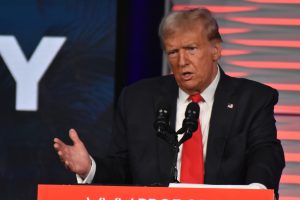Donald Trump recently signaled that Taiwan could receive less support from Washington should he win the U.S. presidential election on November 5. The Republican candidate and former president has stated that Taiwan should eventually raise its defense budget to 10 percent of its gross domestic product – three times the U.S. rate – given that a Chinese attack was one day inevitable. Trump also compared U.S. defense support for Taiwan to an “insurance company,” suggesting that Taiwan should pay the United States for its protection.
But Trump’s bluster and transactional worldview should not distract from the fact that a second Trump administration looks set to continue siding with Taiwan against China.
Concerns about Taiwan-U.S. relations under a second Trump administration stem from the fear that Taiwan could become a bargaining chip should Trump decide to make a deal with Beijing. He said in late 2016 that only “a deal with China on other things” would help him get behind the One China policy, which is based on a 1972 Shanghai Communiqué in which the United States acknowledged Beijing’s position “that Taiwan is part of China” and called for “a peaceful settlement” of the issue. Although he later shifted to supporting “One China” with no strings, Trump had suggested that a half-century of U.S. “strategic ambiguity” over Taiwan could be up for grabs should Beijing make an appropriate offer.
However, with a possible second Trump administration looming, it is hard to imagine any concessions from Beijing that would be substantial enough for Trump to agree to any kind of compromise on Taiwan. Beijing has stated clearly that its position on the island is not negotiable. At the same time, intensified China-U.S. competition makes Taiwan’s strategic importance within the U.S.-dominated “first island chain” in the Pacific Ocean and its economic importance as a supplier of advanced semiconductors more crucial than ever – even for the transactionally-minded Trump.
Concerns about Trump and Taiwan-U.S. relations also ignore the fact that the bilateral relationship saw a notable upgrade, both symbolically and substantively, following Trump’s election victory in November 2016. The president-elect broke with diplomatic tradition by initiating a phone call with Taiwan’s President Tsai Ing-wen in 2016. As president, Trump saw to it that arms sales to Taiwan rose significantly, from $14 billion over eight years under President Barack Obama to $18 billion in just four years under Trump. High-profile visits, such as that of Health Secretary Alex Azar in 2020, and the U.S. Taiwan Travel Act of 2018, which allows for higher-level exchanges, further solidified ties.
The Trump administration arguably set the tone for the high-level engagement with Taiwan that was taken up by the Biden administration – for example, with the 2022 visit of then-U.S. House of Representatives Speaker Nancy Pelosi. This continuity shows that countering China will remain a core policy focus, regardless of whether a Republican or Democrat is in power.
Trump’s running mate J.D. Vance and Republican national security experts such as Elbridge Colby have emphasized the need to prevent China from gaining control of Taiwan by strengthening deterrence capabilities in Asia. Their strategy focuses on managing U.S. costs while ensuring that allies share the burden. Both Colby and Robert O’Brien, Trump’s former national security adviser, have called for Taiwan to increase its defense budget, currently at from 2.45 percent of GDP; Colby recommended 10 and O’Brien 5 percent. Matthew Pottinger, Trump’s former deputy national security adviser, has also urged Taiwan to prepare for a possible Chinese invasion.
Trump’s “America First” worldview, combined with the perception that China is the primary threat to U.S. interests, would likely shift U.S. foreign policy to focus more on Asia. Vance has advocated for Europe to take a greater role in ensuring its own security, including supporting Ukraine, so that the United States can prioritize countering China. This could see a second Trump administration adopt a more unilateral approach to sanctioning China, reduce coordination with allies, and implement higher tariffs and industrial policies at their expense.
As worrying as such policy shifts would be for Europe, they would offer opportunities for Taiwan and other East Asian states to enhance their security through more active U.S. involvement. While Trump’s call for Taiwan to raise military spending to 10 percent of GDP is unrealistic, Taipei could increase its defense budget and purchases of U.S. weapons to bolster its security and solidify its relationship with the United States even further. By using its financial prowess to secure more U.S. support, Taiwan would also confirm Trump’s transactional worldview that money talks.
































